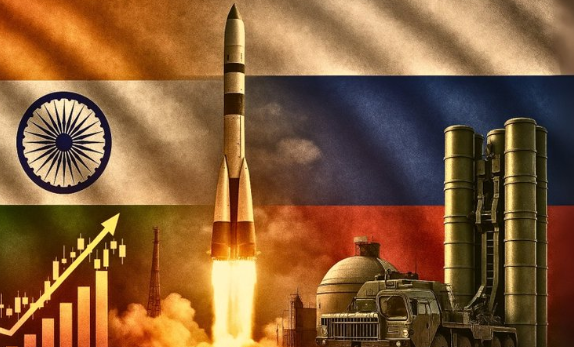The Russian Foreign Ministry has praised India for its determination to strengthen ties with Moscow despite Western pressure and threats. Highlighting India’s strategic autonomy, sovereignty, and refusal to join anti-Russian sanctions, Moscow emphasized ongoing cooperation in defense, energy, space, and nuclear projects, as well as initiatives for national currency trade and alternative logistics. The statement also underscored India’s active role in BRICS and SCO, calling Indo-Russian relations resilient and future-oriented.
Moscow Hails India’s ‘Determination’ Amid Global Pressure
In a strong statement on Indo-Russian relations, the Russian Foreign Ministry has praised India for maintaining its independent foreign policy stance and deepening cooperation with Moscow despite mounting pressure and threats from Western nations. Speaking to RT, Russia emphasized that New Delhi’s determination to safeguard sovereignty, pursue strategic autonomy, and expand multifaceted cooperation underscores the resilience of the decades-long India-Russia partnership.
The comments come at a time when global geopolitics is witnessing renewed polarization, particularly due to the ongoing conflict in Ukraine and the widening divide between Western powers and Russia. Against this backdrop, Moscow has hailed New Delhi’s ability to resist pressure from Washington and its allies while continuing to strengthen ties with Russia across strategic, economic, and security domains.
On Tariffs and Trade Pressure
The Russian Foreign Ministry highlighted that India’s determination to move forward with Russia despite external threats reflects the maturity and stability of the relationship. “We welcome the fact that India, despite pressure and threats, demonstrates a determination to continue and develop multifaceted cooperation with Russia. Frankly speaking, it would be hard to imagine otherwise,” the ministry stated. This remark underscores that India’s independent position has become a cornerstone of its external economic policy, especially when Western nations are attempting to impose restrictive trade regimes targeting Moscow.
Sovereignty and Strategic Autonomy
Moscow further noted that India’s stance is rooted in its commitment to sovereignty and national interests. “This approach not only corresponds to the spirit and traditions of the long-standing Russian-Indian friendship but also reflects New Delhi’s aspiration to uphold what they call strategic autonomy in international affairs. Essentially, this is about the supreme value of sovereignty and the primacy of national interests,” the ministry stressed.
This recognition from Russia highlights New Delhi’s balancing act—engaging with the West while refusing to compromise on its independent decision-making, particularly in matters concerning national energy security, defense partnerships, and foreign policy orientation.
Expanding Bilateral Cooperation
The Russian Foreign Ministry also underlined the breadth of Indo-Russian cooperation, which spans both civilian and military domains. “Our countries carry out large-scale joint projects in various fields. These include the production of civilian and military products, the launch of manned spacecraft, the construction of nuclear power plants, and the development of hydrocarbons on Russian territory.”
This wide-ranging collaboration illustrates how the partnership goes beyond defense and energy, touching upon space exploration, nuclear technology, and advanced manufacturing—sectors that are strategically crucial for India’s rise as a global power.
National Currency Settlements and Financial Sovereignty
A key area of focus for Moscow is reducing dependency on Western-dominated financial systems. Highlighting this, the ministry said, “The key to success is joint work on integrating national payment systems, increasing the share of settlements in national currencies, and establishing alternative transport and logistics routes.”
For India, greater use of the rupee in bilateral trade with Russia not only reduces exposure to sanctions but also strengthens its global push for a more multipolar financial system. The push for alternative trade and logistics mechanisms also highlights both countries’ determination to bypass Western-led restrictions.
India’s Stance on Global Conflicts
Moscow praised New Delhi’s independent position on global issues, particularly the Ukraine conflict. “New Delhi’s stance on the international stage, including in the context of the conflict in Ukraine, clearly demonstrates the consistency of its sovereignly formed approach to cooperation with Moscow,” the ministry noted.
India has consistently called for dialogue and diplomacy to resolve the conflict while maintaining trade relations with Russia, especially in energy imports. This balancing act has drawn criticism from Western capitals but has also reinforced India’s role as an autonomous power.
Rejecting Anti-Russian Sanctions
A significant highlight of the Russian Foreign Ministry’s remarks was India’s refusal to participate in sanctions against Moscow. “India does not join anti-Russian actions despite growing pressure from the United States and its satellites,” the ministry observed.
It further added, “We are convinced that attempts to impose someone else’s will on India—a great power with a population of 1.4 billion people, ranking third in world trade—are doomed to fail from the outset.” This reflects Russia’s acknowledgment of India’s growing influence in the global economic order and its unwillingness to bend under external pressure.
India’s Role in BRICS and Multipolarity
Moscow also praised New Delhi’s active participation in multilateral platforms such as BRICS and the Shanghai Cooperation Organisation (SCO). “India is an active participant in the BRICS and SCO formats – important platforms embodying the concept of a multipolar world free from unilateral diktat and domination,” the statement read.
Through these platforms, India and Russia both seek to promote an alternative world order, challenging the dominance of Western-centric institutions.
Outlook for Indo-Russian Relations
Summing up its position, the Russian Foreign Ministry reaffirmed confidence in the long-term trajectory of Indo-Russian ties. “In short, Russia-India relations are developing steadily and confidently, opening up new prospects for mutually beneficial cooperation for both countries. Any attempts to hinder them are doomed to fail,” it concluded.
This strong endorsement reflects the growing importance of the India-Russia partnership at a time of shifting global power dynamics. With energy, defense, space, and nuclear cooperation at the core, and new initiatives in financial systems and logistics underway, the partnership seems poised to expand further.
For New Delhi, the challenge will remain in balancing its deepening engagement with Moscow with its equally important relationships with the West. However, as Moscow’s latest remarks make clear, India’s commitment to sovereignty and strategic autonomy continues to win recognition—and respect—from one of its oldest partners on the world stage.

